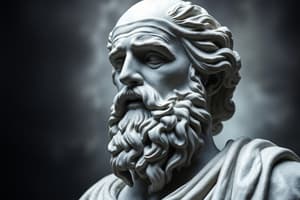Podcast
Questions and Answers
According to Aristotle, what governs a human person's activities for a harmonious life?
According to Aristotle, what governs a human person's activities for a harmonious life?
- Passion
- Intellect
- Reason (correct)
- Senses
What is the primary composition of the self, according to Aristotle?
What is the primary composition of the self, according to Aristotle?
- Body and passion
- Body and soul (correct)
- Soul and intellect
- Mind and matter
What does Aristotle believe is essential for achieving human happiness?
What does Aristotle believe is essential for achieving human happiness?
- Development of physical, economic, and social powers (correct)
- Acquiring wealth
- Neglecting the body
- Focusing solely on the mind
Which concept introduced by Aristotle emphasizes living a life of moderation?
Which concept introduced by Aristotle emphasizes living a life of moderation?
What two aspects does Aristotle believe should not be neglected in a person's development?
What two aspects does Aristotle believe should not be neglected in a person's development?
What does Aristotle define as true knowledge?
What does Aristotle define as true knowledge?
What outcome occurs when the senses dominate a person's life, according to Aristotle?
What outcome occurs when the senses dominate a person's life, according to Aristotle?
What is the relationship between wisdom and virtue in Aristotle's philosophy?
What is the relationship between wisdom and virtue in Aristotle's philosophy?
What was St. Augustine's view on the relationship between the body and the soul?
What was St. Augustine's view on the relationship between the body and the soul?
According to St. Augustine, what is the ultimate source of happiness?
According to St. Augustine, what is the ultimate source of happiness?
How did St. Augustine define virtue?
How did St. Augustine define virtue?
What concept did St. Augustine reject in his philosophy?
What concept did St. Augustine reject in his philosophy?
Which philosophical influence did St. Augustine integrate into his understanding of the self?
Which philosophical influence did St. Augustine integrate into his understanding of the self?
What role did divine revelation play in St. Augustine's philosophy?
What role did divine revelation play in St. Augustine's philosophy?
How did St. Augustine view human beings in relation to God?
How did St. Augustine view human beings in relation to God?
What invitation did Augustine believe humans must respond to for inner peace?
What invitation did Augustine believe humans must respond to for inner peace?
What aspect of the self does Plato emphasize as the immortal part?
What aspect of the self does Plato emphasize as the immortal part?
According to Plato, what happens to the spirited part of the soul after death?
According to Plato, what happens to the spirited part of the soul after death?
In Plato's philosophy, how does the body relate to the soul?
In Plato's philosophy, how does the body relate to the soul?
What is the purpose of life, according to Plato's conception of the self?
What is the purpose of life, according to Plato's conception of the self?
How does Plato describe the relationship between the soul and the world of ideas?
How does Plato describe the relationship between the soul and the world of ideas?
Which of the following best describes the appetitive part of the soul, according to Plato?
Which of the following best describes the appetitive part of the soul, according to Plato?
Plato contrasts the soul's immortality with which other aspect of the self?
Plato contrasts the soul's immortality with which other aspect of the self?
What is Plato's view on the rational part of the soul?
What is Plato's view on the rational part of the soul?
What is Augustine's view on the human soul?
What is Augustine's view on the human soul?
According to St. Thomas Aquinas, what are the two parts that compose a human person?
According to St. Thomas Aquinas, what are the two parts that compose a human person?
Rene Descartes is known for which of the following statements?
Rene Descartes is known for which of the following statements?
What does David Hume believe the self to be?
What does David Hume believe the self to be?
Which aspect distinguishes Descartes' concept of the self from that of Hume?
Which aspect distinguishes Descartes' concept of the self from that of Hume?
What is the significance of matter and form in St. Thomas Aquinas’ philosophy?
What is the significance of matter and form in St. Thomas Aquinas’ philosophy?
Which of the following philosophically characterizes the self according to St. Augustine?
Which of the following philosophically characterizes the self according to St. Augustine?
What is suggested about the nature of the self according to certain philosophical perspectives?
What is suggested about the nature of the self according to certain philosophical perspectives?
What is a key difference in how Medieval and Modern philosophers understand the self?
What is a key difference in how Medieval and Modern philosophers understand the self?
Which philosopher argued against the separation of mind and body?
Which philosopher argued against the separation of mind and body?
What aspect of the body does Merleau-Ponty emphasize in relation to existence?
What aspect of the body does Merleau-Ponty emphasize in relation to existence?
How do modern philosophers generally view the concept of an internal, non-physical self?
How do modern philosophers generally view the concept of an internal, non-physical self?
In what manner does Merleau-Ponty integrate thoughts, emotions, and experiences?
In what manner does Merleau-Ponty integrate thoughts, emotions, and experiences?
What does the notion of 'self' imply in the context of behavior according to the discussed perspectives?
What does the notion of 'self' imply in the context of behavior according to the discussed perspectives?
Which of the following statements aligns with the views of philosophers discussed regarding the self?
Which of the following statements aligns with the views of philosophers discussed regarding the self?
What philosophical stance is taken regarding behavior in relation to understanding the self?
What philosophical stance is taken regarding behavior in relation to understanding the self?
Flashcards are hidden until you start studying
Study Notes
The Self According to Ancient Greek Philosophers
-
Plato (428-348 BC)
- Self is an immortal soul existing in a perishable body.
- Soul has three parts: rational (governs reason), spirited (controls emotions), and appetitive (manages desires like hunger and sexual urges).
- Only the rational soul survives after death; it is immutable and divine, while the body is transient.
- Concept of self as "a soul using the body"; life viewed as a journey towards the world of ideas.
-
Aristotle (384-322 BC)
- Self is a combination of body and soul, intertwining mind and matter, sense and intellect.
- Reason is supreme and should direct all activities; when senses dominate, life is chaotic.
- Happiness stems from a balanced development of physical, economic, and social dimensions.
- Advocated the "Golden Mean" – virtue lies in moderation rather than extremes.
The Self According to Medieval Philosophers
-
St. Augustine (354-430 AD)
- Self consists of a body and a soul, forming one unified individual.
- The concept of self revolves around the individual's relationship with God, created in His image.
- Happiness and inner peace found through recognizing God's love and accepting His invitation to love.
- Critique of hedonism; happiness sought in God rather than transient pleasures.
-
St. Thomas Aquinas (1225-1274)
- Human knowledge of truth is attainable through reason.
- Self composed of two components: matter (physical substance) and form (essence).
The Self According to Modern Philosophers
-
René Descartes (1596-1650)
- Considered the father of modern philosophy; emphasized self-awareness.
- Famous for "Cogito, ergo sum" (I think, therefore I am) underscoring self-existence.
- Self is a blend of two elements: the thinking mind (cogito) and the physical body (extenza).
-
David Hume (1711-1776)
- Proposed the self as a "bundle of impressions" derived from sensory experiences.
- Rejects the notion of a permanent, internal self; focuses on observable behaviors.
-
Maurice Merleau-Ponty (1908-1961)
- Emphasized the inseparability of mind and body; argues their integration is vital for existence.
- Considers the living body, thoughts, emotions, and experiences as a unified whole.
Studying That Suits You
Use AI to generate personalized quizzes and flashcards to suit your learning preferences.





